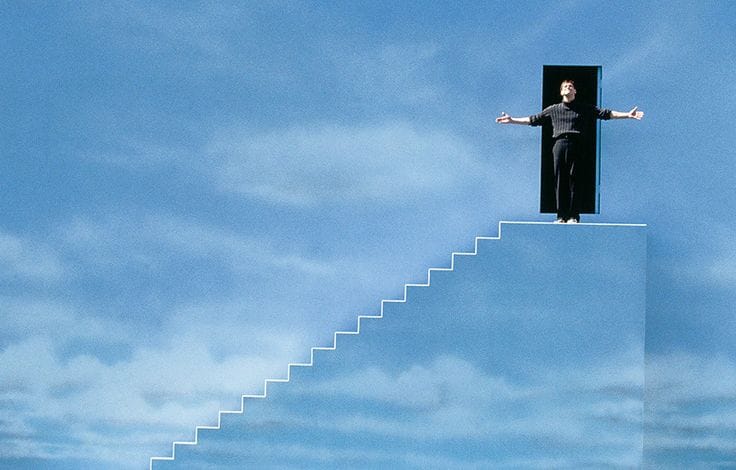
The Truman Show was not just a speculative fiction, it was a prophecy.
The 1998 classic, directed by Peter Weir and written by Andrew Niccol, admits of many interpretations: as a satire of the movements towards so-called realism in art and in particular the rise of reality TV, as one of the many films from the late 1990s to express consternation with the prison-like stasis of post-Cold War American life, as an exploration of humanity’s god complex. Among the most apparent, though, is as a version of Plato’s Allegory of the Cave, where Truman acts as the prisoner, escaping from his false impression of reality and discovering the world as it really is. Plato’s Cave cropping up in art is nothing new; the image has been invoked for millennia in myriad contexts wildly separate from its original function as an explication of the metaphysics of intelligible forms.
But expressing it through the story of a man coming to realize his entire life is a TV show seems poignant for our current age, and more than a quarter century past its release the film has only grown in relevance. It anticipated the increasing commercialization of art, and the degree to which commercial control is at odds with creativity, something today’s artists should be especially wary of. Even further, though, it is striking to consider when revisiting the film today whether we are all trapped inside our own Truman Shows, in solipsistic bubbles where we are sedated by the larger forces of capital and made vehicles for profit.
The film begins with interview clips from Christoph, the show’s godlike creator, and its lead actors, all attesting to the idea of The Truman Show being real life, free from the artifice of television. (For clarity, by the way, when The Truman Show is italicized in this article it refers to the film itself, and when it is not italicized it refers to the fictional television show on which the film focuses.)
But of course, the “real life” the show claims to present is entirely a fabrication. Not just because it occurs in a gigantic dome with computer-controlled sunlight and weather where everyone acts based on directions from an earpiece, but in a much deeper sense, because Truman’s life is scripted from the outset. Everything is pre-determined: what job Truman will have, who his friends will be, whom he will marry. The aim of The Truman Show is not to follow a real person as he goes about his life, it is to get Truman to live a specific kind of life, one which the show is trying to sell. When the show gets its audience to buy into the idea that it is presenting real, regular life, it gets the immense and very monetizable power to determine what real, regular life looks like. For The Truman Show, that is small-town Americana life with a cubicle job and a heterosexual marriage, and everything within that “regular life” – the clothes everyone wears, the houses they live in, the food they eat – is literally for sale. The Truman Show is not real life, it is an advertisement, and in the eyes of Christoph and the show’s producers, Truman is not a person, he is a product.
As a product, Truman must be controlled. He must be kept in his little box, both the literal box that constitutes his world and the figurative box of the life Christoph has laid out for him. He cannot be allowed the free will to try anything new or unknown, because that would mean a loss of control for Christoph over the narrative the show is selling. Truman’s life must be predictable, as predictability equals profit. So the mechanisms of Truman’s world all serve to coddle him, to keep him sedate in his office job and little seaside town and unfulfilling marriage, to prevent him from exercising any self-determination.
This post is for paying subscribers only
Subscribe now and have access to all our stories, enjoy exclusive content and stay up to date with constant updates.
Already a member? Sign in
